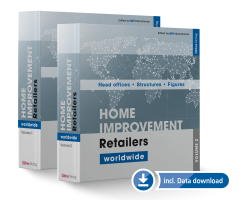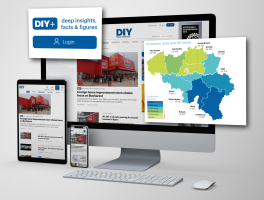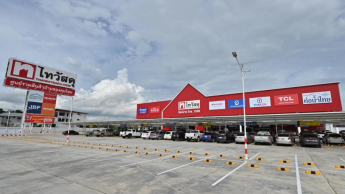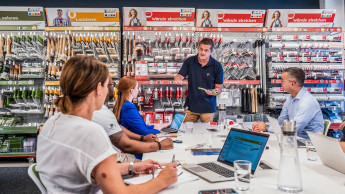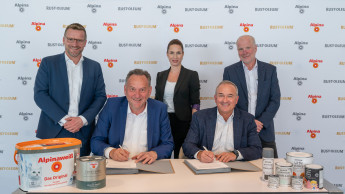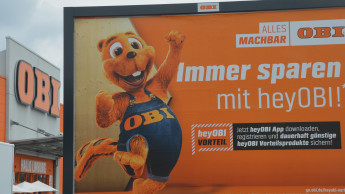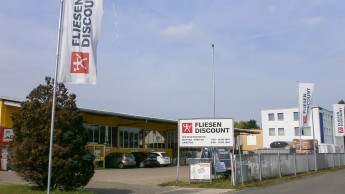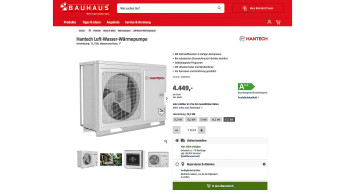
deep insights, facts & figures
03.08.2010
The 1st European Home Improvement Forum, which was held in Vienna on 10 and 11 June 2010, offered a packed programme over a full one and a half days. The list of speakers included the CEOs of the major DIY chains. Following are some of the highlights from the speeches of Ian Cheshire, Sergio Giroldi and Martin Essl to add to the coverage in our specialist magazine, DIY International
Ian Cheshire, CEO of Kingfisher, went into detail on the five consumer trends around the world. Fashion: The home is perceived as the “expression of who I am”, like a fashion statement in clothing. Cheshire’s prediction is of “more personalization of the home”. Do it for me: Consumers are increasingly finding themselves in a situation that can be described as “more money, less time”. Added to this is the fact that the internet generation has fewer manual skills. For instance, 50 per cent of Kingfisher customers ordering a kitchen pay to have it installed at the same time. Innovation: As Reinhard Wolff had already emphasized during the duologue at the start of the conference, innovation has a key role to play in the DIY market. Multi channel: It is becoming increasingly important not to exclude the social media. Mr Cheshire is convinced that “You need to understand the view of the customers.” Green consumers: The market for this customer group in the United Kingdom is estimated to be worth £10 bn. “Good for the planet and good for our business,” says Cheshire. In his eyes there is a key role in store for innovations in the field of eco-products. In his speech Sergio Giroldi, CEO of Obi, oriented himself towards the official conference programme, which he went through point by point. On the fact that it is a Europe-wide conference: Europe is more and more our market of reference. We want a clear cooperation. And on the fact that it is the two European manufacturing and retailing associations that have jointly got the Forum going: We need a clear cooperation, we need some differentiation. On the theme of the conference, “The new chess board after the crisis”: The crisis is confronting us. The customers will have less disposable income. There will be more market concentration on both the manufacturer and the retailer side. In Giroldi’s opinion the factor that will alter the whole game, not just the rules of the game, is e-business. And sooner than we expect. Consequently the future of DIY must lie in a modern retailing policy. “Stay relevant for the customer” today means managing a multi-channel strategy. Giroldi called for a new way of doing business between retailers and suppliers and a renewed partnership model. On Obi’s international perspective, Giroldi simply said, “We are ready to compete.” He spoke of the “consolidation of our presence in Germany”. It is always the company’s policy to be part of the local culture. Giroldi sees a totally different symbol in the chessboard featured in the conference logo: the starting flag of a motor race. “We are committed not to play but to race.” In his address Martin Essl, CEO of Baumax, went into the significance of sustainability: “Family-run companies knew about it before the word was even invented.” He named four major activities that are being carried out in his company: Changed lighting systems that lead to cost savings of 35 per cent. New heating technology: Geothermal systems in five new locations are reducing carbon emissions by 75 per cent, while amortizing the initial cost in seven to ten years. Green logistics: The loading capacity of HGVs has been increased from 60 to 95 per cent. The company works with central handling facilities and local suppliers. Energy management system What is more, Baumax implements customer-oriented projects, which include an energy-saving product line with a special logo. In conclusion Essl acknowledged the social impact of the idea of sustainability: to be fair towards both customers and employees. For instance, the company has 150 disabled employees, most with a mental impairment – with astonishing results for the stores: the working climate of the teams including these colleagues is “much more tolerant and relaxed”.
Related articles
Read also

 Menü
Menü



